The Right Codes for ASD-Related Services
Crack the code for ASD-related services! Simplify the process and ensure accurate coding for autism services.

Understanding ASD-Related Services
When it comes to accessing and receiving services for Autism Spectrum Disorder (ASD), proper coding plays a crucial role. Understanding the importance of coding and having an overview of the coding process is essential for individuals with ASD and their families.
Importance of Proper Coding
Proper coding is vital for several reasons. Firstly, it ensures accurate documentation and communication between healthcare providers, insurers, and other relevant parties involved in the care of individuals with ASD. Accurate coding allows for effective tracking of services provided, reimbursement processes, and monitoring of outcomes.
Additionally, proper coding helps in maximizing insurance coverage and reimbursement for ASD-related services. Insurance companies rely on specific codes to determine coverage eligibility and the level of reimbursement for services. By correctly coding the services, individuals with ASD can ensure that they receive the support they need while minimizing out-of-pocket expenses.
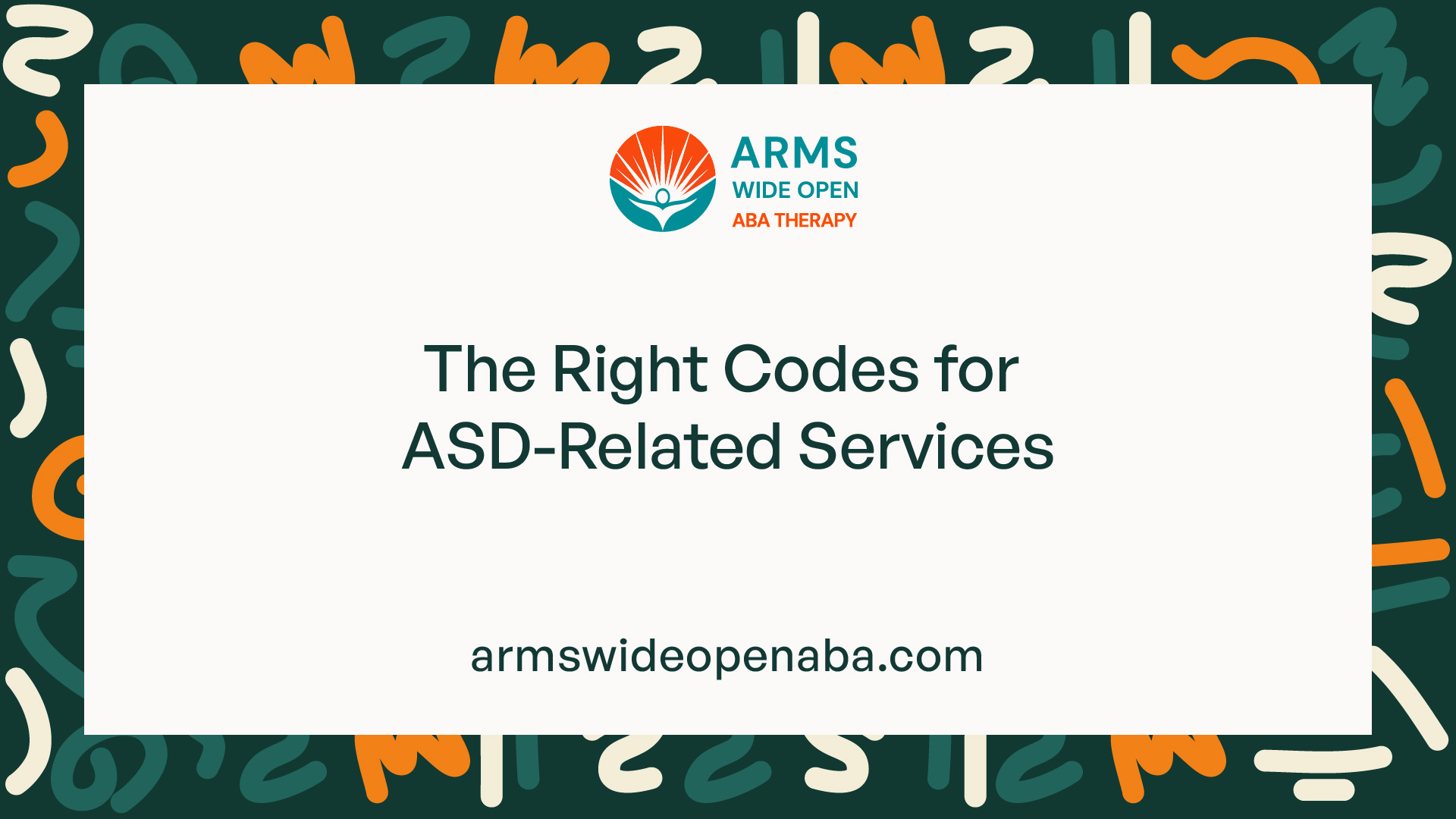
Overview of the Coding Process
The coding process involves assigning specific codes to represent the services provided to individuals with ASD. These codes are standardized and universally recognized, allowing for consistency in documentation and communication. The two main code sets used in healthcare settings are the Current Procedural Terminology (CPT) codes and the International Classification of Diseases (ICD) codes.
CPT codes are used to identify and describe the procedures and services provided during a healthcare visit. They encompass a wide range of services, including therapy sessions, assessments, and consultations. Each service is assigned a unique code that helps to determine the level of care provided.
On the other hand, ICD codes are used to classify and diagnose medical conditions. These codes provide a standardized way to document and track ASD diagnoses, allowing for better understanding of the prevalence and impact of the disorder.
Understanding the coding process can empower individuals with ASD and their families to advocate for appropriate services, navigate insurance coverage, and ensure accurate documentation. By familiarizing themselves with the codes relevant to ASD-related services, they can actively participate in the decision-making process and access the necessary support for themselves or their loved ones.
The next sections will delve deeper into the specific codes used for ASD-related services, the nuances of coding for therapy services and diagnostic assessments, navigating insurance coverage, the importance of accurate documentation, and resources available for code assistance.
Decoding ASD-Related Services
When it comes to navigating the complex world of ASD-related services, understanding the codes used for billing and reimbursement is crucial. Proper coding ensures accurate documentation and appropriate reimbursement for the services provided. In this section, we will explore the common codes used for Autism Spectrum Disorder (ASD), as well as coding for therapy services and diagnostic assessments.
Common Codes Used for Autism Spectrum Disorder (ASD)
To accurately capture ASD-related services, healthcare providers and insurance companies utilize specific codes. These codes help in identifying the type of service provided, allowing for proper documentation and reimbursement. Here are some of the commonly used codes for Autism Spectrum Disorder:
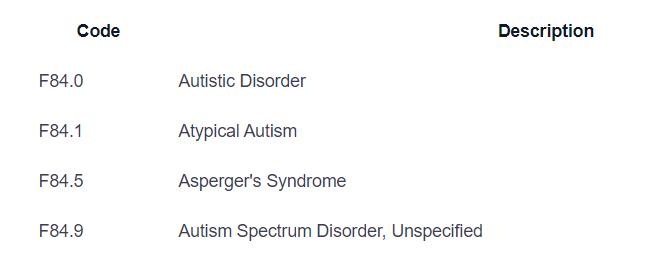
These codes provide a standardized way of categorizing and documenting different subtypes of ASD. It's important to note that the specific codes used may vary depending on the coding system utilized by healthcare providers and insurers.
Coding for Therapy Services
Therapy services play a vital role in the treatment of individuals with Autism Spectrum Disorder. Proper coding for therapy services ensures accurate billing and reimbursement. Here are some of the commonly used codes for therapy services related to ASD:
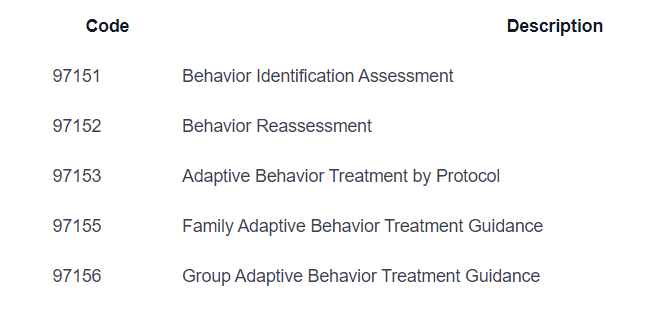
These codes represent different aspects of therapy services, including assessments, reassessments, and treatment sessions. It's important for healthcare providers and therapists to accurately select the appropriate codes based on the specific services provided.
Coding for Diagnostic Assessments
Diagnostic assessments are crucial in identifying and diagnosing Autism Spectrum Disorder. Proper coding for diagnostic assessments ensures accurate documentation and reimbursement. Here are some of the commonly used codes for diagnostic assessments related to ASD:
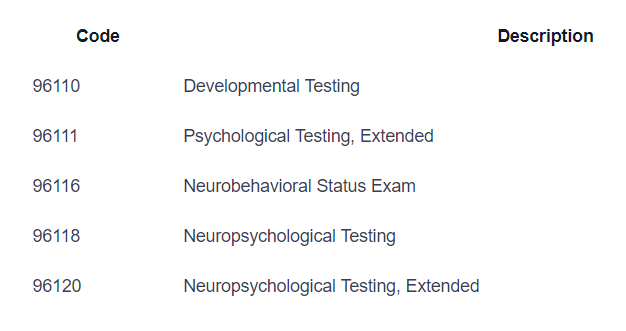
These codes represent different types of assessments, including developmental testing, psychological testing, and neurobehavioral status exams. The specific codes used may vary depending on the type and complexity of the assessment conducted.
Understanding and utilizing the appropriate codes for ASD-related services is essential for accurate documentation and reimbursement. Healthcare providers, therapists, and insurance companies must work together to ensure that the services provided are properly coded to reflect the specific needs of individuals with Autism Spectrum Disorder.
Navigating Insurance Coverage
Understanding the intricacies of insurance reimbursement for ASD-related services is crucial when seeking appropriate care for individuals on the autism spectrum. This section aims to shed light on the process of insurance reimbursement and provide tips for ensuring coverage for ASD-related services.
Understanding Insurance Reimbursement
Insurance reimbursement refers to the process by which insurance companies pay for the services provided to individuals with autism spectrum disorder (ASD). It involves submitting claims with the correct codes and documentation to ensure that the services rendered are eligible for coverage. Insurance coverage for ASD-related services varies depending on the specific insurance plan, so it's important to review the policy and understand the terms and conditions.
To navigate insurance reimbursement effectively, it's essential to be familiar with the codes used for ASD-related services. These codes help insurance companies identify and categorize the services provided, ensuring accurate reimbursement. It's also important to keep in mind that insurance companies may have specific requirements for documentation and billing, so it's crucial to follow their guidelines to avoid delays or denials in reimbursement.
Tips for Ensuring Coverage for ASD-Related Services
When seeking coverage for ASD-related services, it's important to take proactive steps to ensure that the services are eligible for reimbursement. Here are some tips to help navigate insurance coverage effectively:
- Review your insurance policy: Familiarize yourself with the specifics of your insurance plan, including coverage limitations, deductibles, and copayments. Understanding your policy will help you plan and budget for ASD-related services.
- Verify coverage for ASD-related services: Contact your insurance provider and inquire about the coverage available for autism-related services. Ask about the specific services covered, any pre-authorization requirements, and the documentation needed for reimbursement.
- Choose in-network providers: Selecting healthcare providers who are in-network with your insurance plan can help maximize coverage and reduce out-of-pocket expenses. In-network providers have negotiated rates with the insurance company, which can result in lower costs for services.
- Document everything: Keep detailed records of all ASD-related services received, including dates, service descriptions, and provider information. Accurate documentation is crucial for submitting claims and appealing denials, if necessary.
- Submit claims promptly: File claims with your insurance company as soon as possible after receiving the ASD-related services. Prompt submission can expedite the reimbursement process and minimize delays.
- Follow insurance guidelines: Adhere to the insurance company's guidelines for submitting claims and documentation. Pay attention to any specific coding requirements and ensure that all necessary information is included in the claim.
- Appeal if necessary: In the event of claim denials or insufficient reimbursement, be prepared to appeal the decision. Familiarize yourself with the appeals process outlined by your insurance company and gather any additional documentation or information to support your case.
Navigating insurance coverage for ASD-related services can be complex, but understanding the reimbursement process and following these tips can help ensure that individuals with autism receive the services they need while minimizing financial burdens.
Ensuring Accuracy in Coding
Accurate coding is essential when it comes to ASD-related services. Proper documentation and coding practices play a crucial role in ensuring that individuals with Autism Spectrum Disorder (ASD) receive the appropriate care and reimbursement. In this section, we will explore the importance of accurate documentation and strategies for properly coding services related to ASD.
Importance of Accurate Documentation
Accurate documentation serves as the foundation for proper coding of ASD-related services. It provides a comprehensive record of the services provided, supporting the claims submitted for reimbursement. Accurate documentation should include:
- Detailed descriptions of the services rendered, including the nature and duration of the intervention or assessment.
- Clear identification of the provider delivering the service.
- Documentation of the patient's diagnosis, including any relevant diagnostic assessments or evaluations.
- Any relevant progress notes, treatment plans, or reports that demonstrate the medical necessity of the services provided.
By maintaining accurate and detailed documentation, healthcare providers can ensure that the services they provide are properly represented through coding, leading to accurate reimbursement and improved continuity of care.
Strategies for Properly Coding Services
To ensure proper coding of ASD-related services, healthcare providers can implement the following strategies:
- Familiarize Yourself with Applicable Coding Systems: Become well-versed in the coding systems typically used for ASD-related services, such as the Current Procedural Terminology (CPT) codes and the International Classification of Diseases (ICD) codes. These coding systems provide a standardized way to communicate the specific services provided and the associated diagnoses.
- Use Specific and Appropriate Codes: Selecting the most specific and appropriate codes is crucial for accurate billing and reimbursement. Be thorough in documenting the services rendered and choose codes that accurately represent the interventions or assessments conducted.
- Stay Updated with Coding Changes: Coding guidelines and regulations evolve over time. It is important to stay updated with any changes or updates to ensure compliance and accurate coding. Regularly review coding manuals, attend coding seminars, or consult with other healthcare professionals to stay informed about any revisions or new codes that may impact ASD-related services.
- Seek Clarification and Guidance: If you encounter any uncertainties or complexities in coding for ASD-related services, don't hesitate to seek clarification and guidance. Consult with experienced coding professionals, reach out to colleagues, or engage in discussions with professional organizations to ensure accurate coding practices.
By implementing these strategies and maintaining accurate documentation, healthcare providers can navigate the coding process effectively and ensure that ASD-related services are appropriately coded, billed, and reimbursed. This not only benefits the providers but also supports individuals with ASD in accessing the necessary services for their care and development.
Resources for Code Assistance
When it comes to navigating the complex world of coding for ASD-related services, having access to reliable resources is essential. These resources can help ensure accurate coding and proper documentation, which is crucial for insurance reimbursement and effective communication with providers and insurers. Here are two valuable resources that can assist you in finding the right codes for ASD-related services:
Online Code Lookup Tools
Online code lookup tools are a convenient and efficient way to find the appropriate codes for ASD-related services. These tools provide comprehensive databases that allow you to search for specific codes based on various criteria such as service type, diagnosis, and payer requirements. Some popular online code lookup tools include:
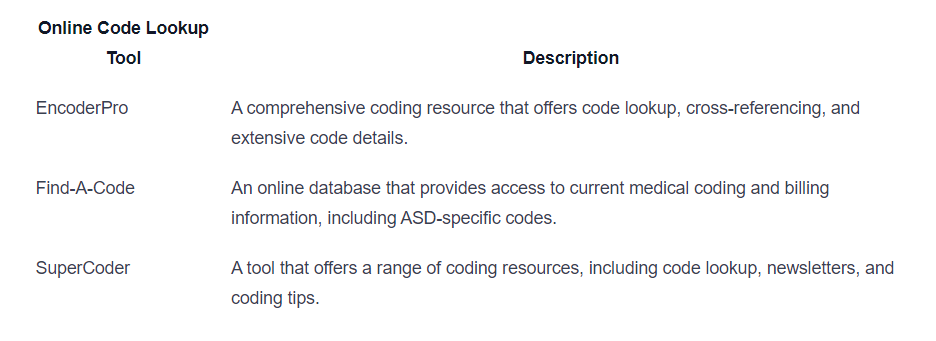
By utilizing these online code lookup tools, you can quickly find the most up-to-date and accurate codes for ASD-related services, ensuring proper documentation and reimbursement.
Consulting with Providers and Insurers
Consulting with providers and insurers can be invaluable when it comes to understanding coding requirements and ensuring accurate coding for ASD-related services. Providers, such as therapists and clinicians, have firsthand experience with coding practices and can provide guidance on selecting the appropriate codes for specific services. Insurers, on the other hand, can offer insight into their specific coding and documentation requirements.
When consulting with providers and insurers, consider asking the following questions:
- Which codes are commonly used for ASD-related services?
- Are there any specific coding guidelines or requirements that need to be followed?
- Are there any changes or updates to the coding system that I should be aware of?
- What documentation is necessary to support the selected codes?
By actively engaging with providers and insurers, you can stay informed about any changes in coding practices and ensure that your coding aligns with their requirements. This collaboration can help minimize coding errors and maximize the chances of successful reimbursement for ASD-related services.
By leveraging online code lookup tools and consulting with providers and insurers, you can confidently navigate the coding process for ASD-related services. These resources provide the necessary support and guidance to ensure accurate coding, proper documentation, and effective communication with all stakeholders involved in the care of individuals with autism spectrum disorder.
Advocating for Proper Coding
Advocacy plays a crucial role in ensuring accurate coding for ASD-related services. By advocating for proper coding, individuals can help improve the reimbursement process, access appropriate services, and ensure that insurance coverage is utilized effectively. Here, we will explore the importance of advocacy for accurate coding and strategies for effectively communicating with providers and insurers.
Importance of Advocacy for Accurate Coding
Advocacy for accurate coding is essential to ensure that individuals with Autism Spectrum Disorder (ASD) receive the appropriate services they need. Here are a few key reasons why advocating for proper coding is important:
- Access to Appropriate Services: Accurate coding helps individuals access the specific services and interventions that are necessary for their unique needs. By advocating for accurate coding, individuals can ensure that the right services are covered by insurance and available to those who need them.
- Effective Reimbursement: Proper coding facilitates efficient reimbursement processes. When services are correctly coded, insurance claims are more likely to be processed smoothly, reducing delays and potential denials. Advocating for accurate coding helps individuals navigate the reimbursement process effectively.
- Transparent Communication: Accurate coding promotes clear communication between providers, insurers, and individuals seeking ASD-related services. By advocating for proper coding, individuals can ensure that all parties involved understand the specific services provided and the associated costs.
Strategies for Communicating with Providers and Insurers
Effectively communicating with providers and insurers is crucial for advocating for proper coding. Here are some strategies to consider when engaging in these conversations:
- Be Informed: Educate yourself about the coding system relevant to ASD-related services. Understand the specific codes related to therapy services, diagnostic assessments, and any other services that may be required. This knowledge will empower you to have informed discussions with providers and insurers.
- Open Dialogue: Maintain open and honest communication with your healthcare providers. Seek clarification on the coding methods they use and discuss any concerns you may have. By fostering an open dialogue, you can ensure that accurate coding practices are being followed.
- Documentation and Records: Keep thorough documentation of all services received, including therapy sessions, assessments, and any other relevant information. This documentation will help support accurate coding and can be used as evidence during discussions with insurers if necessary.
- Insurance Coverage Review: Regularly review your insurance coverage to ensure that it aligns with the specific ASD-related services you require. If you encounter any discrepancies or issues, reach out to your insurer for clarification and advocate for proper coding to accurately reflect the services needed.
- Seek Professional Assistance: If you encounter challenges or have difficulty navigating the coding and reimbursement process, consider seeking assistance from professionals who specialize in ASD-related services. They can provide guidance, answer questions, and advocate on your behalf.
Advocating for proper coding is an important step in ensuring that individuals with ASD receive the appropriate services they need. By understanding the importance of advocacy and employing effective communication strategies with providers and insurers, individuals can help improve the accuracy and reimbursement of ASD-related services.
Sources
https://on.asha.org/ldr-asd-codes
https://www.icd10data.com/ICD10CM/Codes/F01-F99/F80-F89/F84-/F84.0
https://icd.who.int/browse10/2019/en#/F84
Similar articles
We’re here to help you

Our team is here to assist you in this process. Contact us for any assistance.
it’s easy to apply
We Accept Most Insurances
Our in-network insurance partnerships make ABA therapy more accessible to families throughout our service areas.







Our Insurance Process
We'll request your insurance details to help us verify your plan's coverage for ABA therapy. Once we've received this information, we'll walk you through your benefits, including copayments, deductibles and out-of-pocket maximums, so you know what to expect in advance.
Our team will then handle the preauthorization and all the necessary paperwork.
.svg)





















.jpeg)


































.jpeg)




.jpeg)







.jpeg)











.jpeg)
















